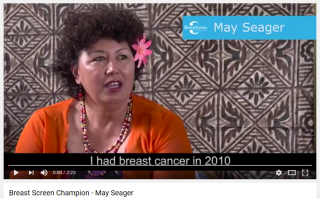- Home
- News
- Screening Matters, Issue 57, December 2016
- Profile: Championing breast screening in Northland
Screening Matters
The National Screening Unit newsletter
In this issue:
- Breast and cervical screening support service providers
- National bowel screening programme roll-out
- Primary Human Papilloma Virus (HPV) Screening project update
- Cervical screening in pregnancy and post-partum
- NCSP Register: what to do if a woman declines cervical screening
- Use of sampling devices in cervical screening
- HPV self-sampling trials
- Changes to ordering NSU information resources
- Profile: Promoting discussions with women about screening
- Profile: Championing breast screening in Northland
- Promoting breast and cervical screening
Profile: Championing breast screening in Northland

The 2013 Census captured an additional 2,000 people (500 Māori) who had previously not been counted. Within that number were women Northland DHB needed to reach to offer the breast screening service.
One initiative to achieve this goal was the development of a breast screening communications strategy led by Kelly Leha'uli and Liz Inch. The strategy focused on Māori and Pacific Island women, encouraging them to not put off their screening, and featured local women sharing their stories across radio commercials, video clips and billboards.
These stories helped raise awareness of Northland and Waitemata DHB’s Mauri Ora Breast Clinic and mobile services and contributed to an increased uptake of breast cancer screening services.
May Seager, breast screening champion and manager of the Northland Pacific Islands Charitable Trust, said the campaign has helped Pasifika women work through fear and anxiety around medical appointments. “For a lot of Pasifika women [breast screening] is something they are a little bit afraid of. But we can be proactive – don’t be shy.”
The Mauri Ora Breast Clinic service is based in Whangarei and the breast screening mobile service visits 13 remote and rural towns across Northland. A key aspect of the campaign has been to work with breast screen champions from these local areas so that locals interpret the messages as important for them.
“I have had lots of people approach me,” said Melva Davis-Mahoney, a breast cancer survivor from Kaitaia. “They have told me how they saw me at the movies and ‘Boom, you were there and your story was so realistic.’”
Northland DHB is again increasing its breast screening rates by achieving 69 per cent of the Māori population for the two-year period to 30 June 2016.
The breast screening champions’ videos can be viewed on the Northland DHB website.
This is an edited version of an original article that appeared in the October edition of PreScribe, Northland DHB’s newsletter.
To receive the Screening Matters newsletter by email, fill out our sign-up form.

